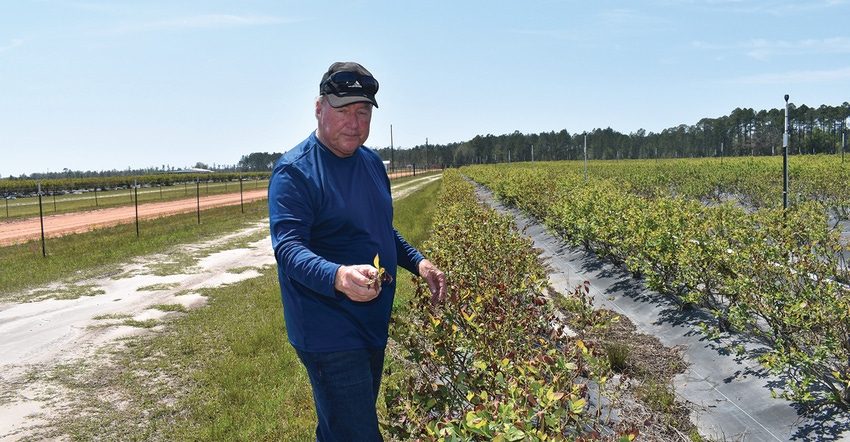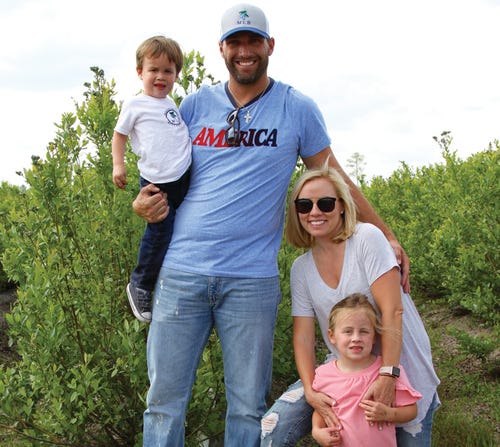
Georgia’s largest organic blueberry farm has come a long way since it was carved from scratch out of a 300-acre section of timberland in 2015. After its initial startup years, Major League Blueberries has become one of the leading organic blueberry suppliers in the U.S.
MLB is in Coffee County, about halfway between Douglas and Nicholls … in other words, in the middle of the state’s prime blueberry growing region. The farm’s name derives from the previous career of one of its three partners: former Atlanta Braves outfielder and current TV broadcaster Jeff Francoeur. The other partners are Malcolm McCoy (Francoeur’s father-in-law) and long-time blueberry expert Winn Morgan.
The concept of MLB derives from McCoy’s previous career. A former pharmaceutical industry executive, he later became the University of Georgia director of corporate relations. His role involved connecting the university’s research to corporations.
“IBM had a local hyper weather forecast system, which could predict the weather down to a one-mile radius, with 89% accuracy, 72 hours in advance.” McCoy said.
They wanted to evaluate it in relation to farming, so they came to the University of Georgia’s College of Agriculture and Environmental Sciences, and the dean said, ‘let’s try this with blueberries.’ Because the blueberry farmer has to know, or it would be good to know, when the freeze is coming, to prepare for it. So, we connected the blueberry farmers in Georgia to this system, to understand their interest and to evaluate the opportunity.”
IBM ended up taking its system in a different direction, but in the process McCoy met with blueberry farmers and became interested in farming. He met Morgan, who wound up becoming a partner and the two discussed building a blueberry farm near McCoy’s home in the Macon area.
“We put three acres in, but as we continued to talk, and brought Jeff into our sessions, we came up with the idea of a bigger farm,” McCoy recalled. “That blossomed into this farm that we have here today.”
McCoy approached his son-in-law about becoming an investor. Francoeur, who admits having little knowledge about growing blueberries prior to his investment, has fully embraced farming although his broadcasting duties keep him away from the farm more than he would like.
“I still look back and wonder how I got into this,” Francoeur said. “More than anything, it was the fact that I was getting close to the end of playing baseball. It was 2015 and I was with the Phillies and I was trying to figure it out. I wanted to have my hands in a few businesses by the time I was done. Honestly, it was good timing, as I was looking for some things to get involved in. I went down right after the end of that baseball season, saw the land, and we talked it through. The next thing you know, I was part-owner of a blueberry farm.”
Two years ago, when COVID curtailed the baseball season, Francoeur spent considerable time on the farm, but that changed when baseball resumed its normal schedule.
“April and May are such a busy time for me, with the blueberry harvest and also the kickoff of baseball season,” he said. “I was in and out a lot at the beginning, but now I get down there six or seven times a year. Not as much as I would like, but still enough that I do get a chance to be really involved.”
The farm sits on a 300-acre tract. About 400,000 plants grow on 160 acres. MLB began in a traditional way, with high bush blueberries. The partners’ bank at the time encouraged them to consider organic farming, which is much more profitable with more consumers becoming interested in organics.
“So, we transitioned to an organic farm and got certified in March 2020 after a three-year transition process,” McCoy recalled. “The first year we sold the entire crop as organic was last year, 2021. We are now Georgia’s largest organic blueberry farm. We produce about 50% of the organic fruit coming out of the state, as well as being one of the largest in the Southeastern U.S.”
Organic isn't easy
Organic farming presents plenty of challenges. McCoy likens it to playing baseball with one hand tied behind your back. Strict standards must be maintained, including using only OMRI (Organic Materials Review Institute) approved products.
“The fertilizers are not as powerful, because they have to be natural,” McCoy said. “The insecticides are not nearly as powerful. Your production will decrease because of that. The good news is you can get twice the price. And the younger consumers are pushing for organics. We are meeting a niche that continues to grow.”
MLB sells directly to Wish Farms, a Plant City, Fla.-based supplier of berries. Wish sells to Costco, Kroger and other retailers. Wish is MLB’s only customer and the two have had a working relationship since the farm’s inception.
Developing a blueberry farm is not a rapid process since blueberry plants take three years to produce and reach maturity at six years. MLB had a good year in 2021, producing a million pounds of berries. The farm is halfway to its production capability, and McCoy said the goal is to reach two million pounds within the next three to five years.
MLB grows 13 varieties, but 80% of its crop is devoted to four varieties. A newly planted 21-acre section is dedicated to a later market crop. Harvest normally begins around the middle of April and runs until early- to mid-June. The new section will give MLB an increased harvest window.
“The new 21 acres will give us another four weeks on the back end of the harvest,” McCoy said. “That will take us through the beginning of July. That’s when the window will disappear here, and then the season moves up to North Carolina, then from there on up the East Coast. “
Late freeze nipped 2022 crop
The potential for another robust harvest was in place until the freeze of March 12-13.
“Like a lot of the farmers here, we’ve lost a majority of the crop. About 75% of Georgia’s blueberry farmers were affected by that freeze on March 12 and 13. It got so cold. We’ve got frost protection out here. It will protect it out to 23 or 24 degrees. But it got down to 20 or 21 here, and our system just couldn’t protect it.
But, that’s why you have crop insurance.”
MLB’s plant’s survived another freeze in January, but McCoy elected not to use the frost protection system because it would have damaged the plants.
“Our buds were so tight, and there was no fruit yet, and we thought they could survive, and they did,” he said. “We used a consultant, Gerard Krueger, a Ph.D horticulturalist out of the University of Georgia. He has since retired, but he is our key guy who tells us what to do.”
MLB did use its frost protection system in March, but temperatures dropped too low.
“To qualify for crop insurance, you have to follow certain farming practices to protect your crop,” McCoy said. “In our situation, the consultant sets best practices for us. But it was one of those situations where no frost protection system would have worked. But you have to try. You’ve got to go for it.”
McCoy enjoys citing the nutritional value of blueberries, especially the organic variety.
“It’s one of the highest antioxidant fruits you can eat,” he said. “The benefit for the mitigation of many physical conditions is incredible. The building up of the body immune system is considerable. The demand for blueberries continues to escalate every year, both for traditional and organic. More and more people are interested in foods that do not have the pesticides and synthetic fertilizers.”
Preparing for 2023
Although this year’s crop was nipped, plenty of work remains for McCoy and his fulltime staff of four. This includes dealing with the freeze damage and readying the farm for the 2023 season.
One focus in the coming months will be battling weeds. As an organic farm, MLB staff pulls weeds rather deploying traditional weed killers. The farm is also trying natural weed killers.
Also on the agenda is building on the progress MLB has made with plants through fertigation, a technique of supplying dissolved fertilizer to crops through an irrigation system.
“So, they are now to the point where they need to have more granular fertilizer,” McCoy said. “We just bought a device to ensure we are properly distributing that. That is a huge task. Up to now, using the drip method, all you have to do is put it into the irrigation system and it’s taken care of.”
Another looming task is hedging, an important process in the aftermath of a freeze.
“When plants get damaged the way ours are, you’ve got to hedge all that stuff off,” McCoy said. “That helps them to grow bigger the next year and produce more fruit.”
Other work will include replanting one of the fields, completing a fencing project, drainage projects and burning in of some fields to fight insects.
“The list of what needs to be done is endless,” McCoy said. “You can spend all day every day working on a farm. You just have to make sure you pick the right fights to focus on, that will have the greatest impact on the growth of your crop.”
McCoy spends at least three days a week at the farm. It’s a task he loves.
“It’s very active right now because of the freeze and what we have to do to recover. But normally I can get the work done in three days a week, because the people we have here are so good, and have done it for so long. On harvest days, we have 350 pickers out here. We won’t have that this year.”
A successful MLB spin-off product is Frenchy’s Blues, a collaboration with Athens, Ga., brewery, Terrapin Beer Co. The beer, which debuted in 2020, is a Berliner Weisse-style brew.
“We have the blueberry beer now because of all this, and it’s pretty darn good,” Francoeur said. It’s opened up some other avenues for me. It will be available at ballparks and in some stores.”
Francoeur’s second career keeps him involved in baseball
Jeff Francoeur broadcasts more than 100 Braves games each season for Bally Sports South and Bally Sports Southeast. He also is an analyst on TBS’s national weekly games. He recently offered Farm Press some observations on the 2022 season and his broadcasting career.

Former Atlanta Braves outfielder Jeff Francoeur poses at his blueberry farm with his wife, Catie, and two of their four children. (Photo: Malcolm McCoy)
Farm Press: What is your observation on how the Freddie Freeman free agency developed?
Francoeur: “It’s been a tough situation. Baseball is a business, but when you have an iconic player like Freddie, it’s never easy to say goodbye and move on. There are only a handful of people who really know what conversations went on behind closed doors. You can speculate all you want, but I do know this: I’ve played long enough to have watched many players come and go and change teams. That is inevitable, but it will never change what he did for the Braves and for the city of Atlanta.
“It’s just poetic justice that on his way out of town, he helped win us a World Series. I would have loved to see him stay, because I think if he had stayed in a Braves uniform, he probably would have gone down as one of the greatest position players in the history of the organization, just behind Hank and Chipper. Things change, but he will always be a massive part of what happened here.”
FP: Will Braves fans accept Matt Olsen as Freddie’s replacement?
Francoeur: The fans have taken a liking to Matt Olsen, and they should. He’s a great kid. He went to my high school (Parkview, just east of Atlanta). I’ve known him a long time. I think Dansby Swanson said it best when he said that it’s okay to be sad that Freddie is gone, but at the same time it’s okay to be excited about Matt and what the future might hold.”
FP: Will there be any lasting effects of the baseball lockout?
Francoeur: The things I worry about more than anything is the potential for arm injuries. Position player-wise, I’m not worried, because in Spring Training, I always used to say, give me 2.5 weeks and we can be ready to go. It’s different with pitchers and getting them ready. Over time it will be okay, but I’m hoping there will be no lasting effects for pitchers not having enough time to prepare.
FP: What do you enjoy most about your broadcasting career?
Francoeur: I love being able to still be involved in baseball, but not have that crazy schedule. Normally, I don’t have to leave my house until late afternoon. So, I can pick the kids up. When you are playing, it’s a much longer day, and even when you get home, your mind is still at the ballpark. I can go on a road trip now, and I can bring my wife and kids with me, and it’s such a different feeling, not having to worry about injuries. I have fun with it. I do 100 games, but I still have time to be with my kids and spend some time at the beach in the summers.
About the Author(s)
You May Also Like






